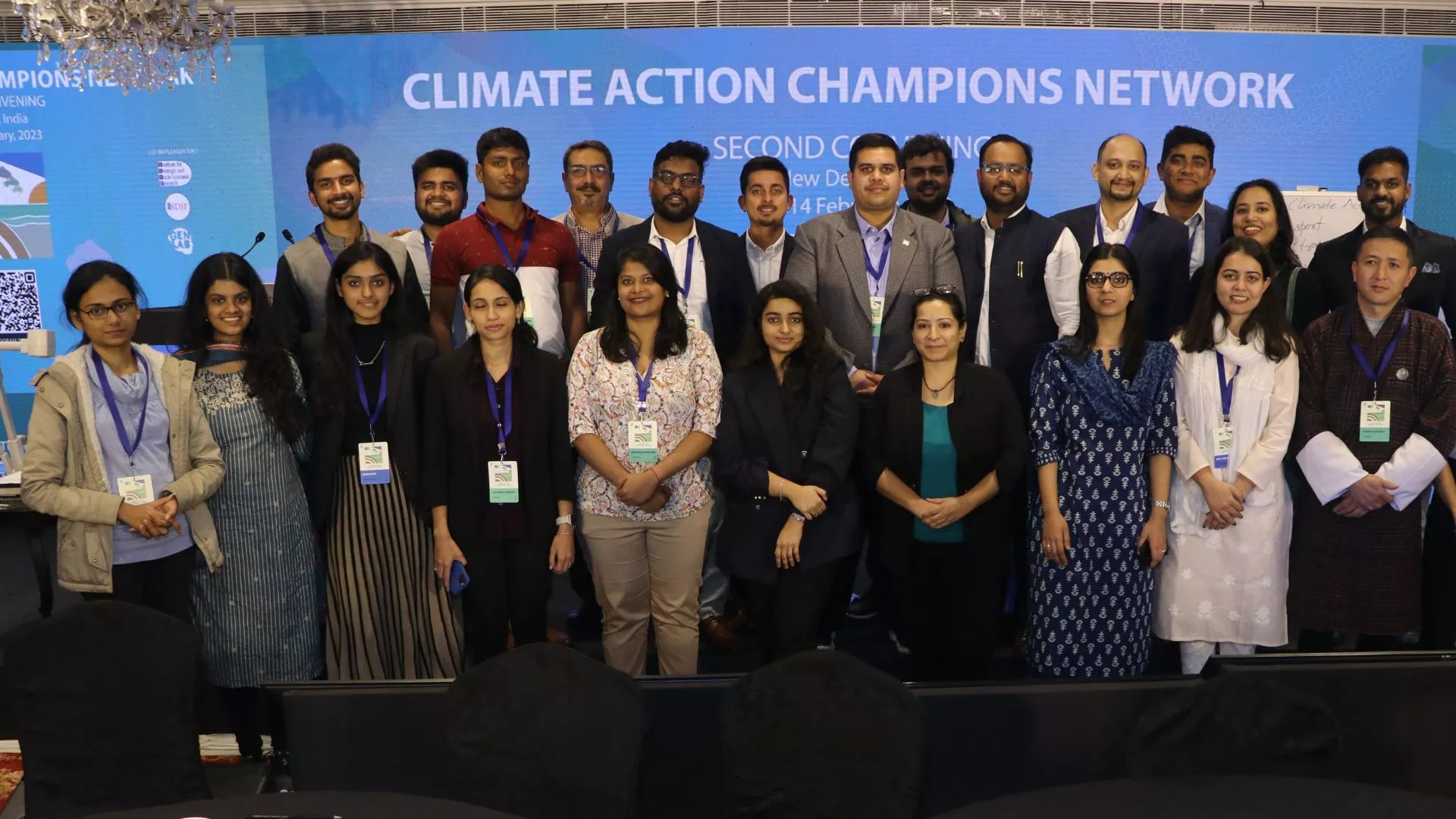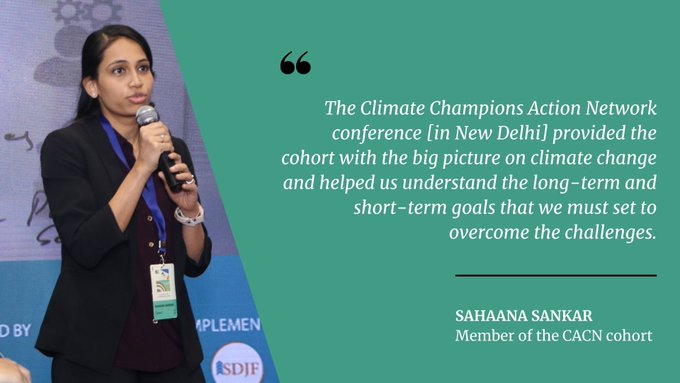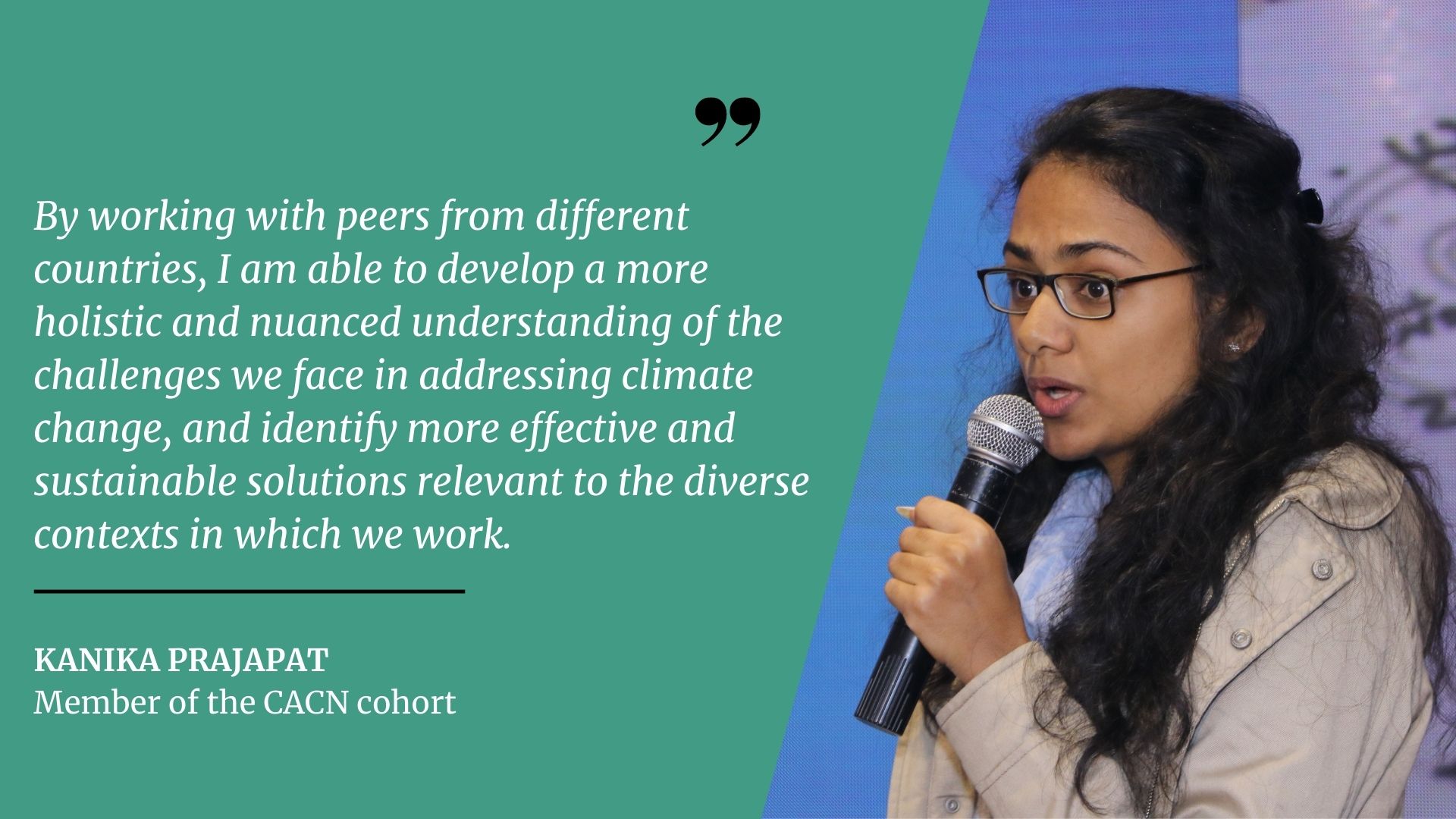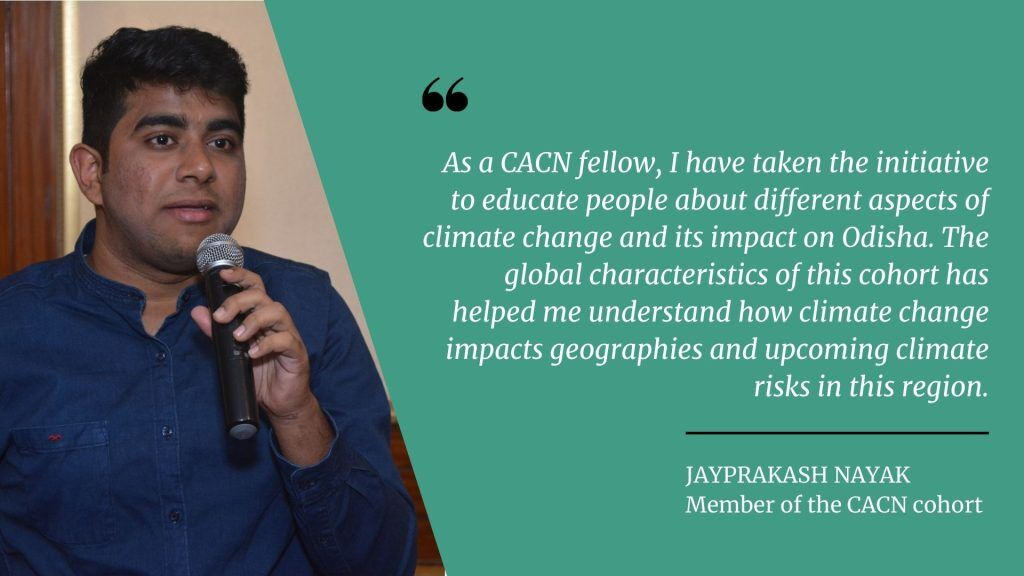A U.S. State Department-funded program brings together the brightest minds from five South Asian countries to fight the climate crisis.
April 2023

The Climate Action Champions Network brings together young leaders from Bangladesh, Bhutan, India, Nepal and Sri Lanka to work on climate action in their home countries and the Indo-Pacific region. Photograph courtesy Jayprakash Nayak.
India and its neighboring countries account for a considerable chunk of the world’s population and biodiversity but also bear the brunt of climate change. The U.S. State Department-funded Climate Action Champions Network (CACN) brings together young leaders from Bangladesh, Bhutan, India, Nepal and Sri Lanka to lead initiatives and advocate for climate action in their home countries and the Indo-Pacific region.
Read about three Indian members of the first CACN cohort.
A voice for awareness
As a social development specialist who works with women, tribal farmers and first-generation learners, Sahaana Sankar believes social and economic empowerment is key to starting a conversation on sustainability. “The more empowered a community, the more voice they have to bring about change and talk about sustainability,” she explains. “We have seen women with a voice influence government decisions at the local body level. For instance, at a village meeting where women advocate for water lines or plantation of trees. Economic empowerment leads to more financial independence, access to information and freedom with the ability to make environment-friendly consumption choices.”
Sankar is the chief operating officer at Hand in Hand India, and focuses on communications and fundraising, primarily through social media. “I believe that social media has a powerful voice in advocating for change,” she says. Hand in Hand is a global nonprofit organization that works toward fighting poverty and creating jobs.

An engineer by education, Sankar is part of the first CACN cohort, and attended its first national conference in Kathmandu, Nepal. The conference “provided the cohort with the big picture on climate change and helped us understand the long-term and short-term goals that we must set to overcome the challenges,” she says.
The similarities among South Asian countries, especially topographical and social, mean the cross-pollination of ideas helps create well-rounded solutions to climate problems. “Most agricultural production practices in India, Sri Lanka and Bangladesh are similar. The terrains of Bhutan and Nepal are similar and ideal for the production of hydroelectricity. Bangladesh’s conservation of mangrove forests mirrors India’s expertise. Our experience is similar—despite the abundance of natural resources, they have been exploited.”
Going forward, Sankar says she wants to use this opportunity to amplify her “voice on social media to create awareness on the impacts of climate change at the grassroots and share different South Asia-based learnings on combating them.”
“I would also like to implement some simple tech-based solutions in agriculture and water conservation that will help farmers in the long run to increase farmland productivity,” she adds.
Collaborating for change
Soon after completing her bachelor’s degree at IIT Delhi, Kanika Prajapat founded Kriya Labs. The start-up creates sustainable tableware from agricultural waste. For Prajapat, it was not just about dealing with the problem of air pollution by making crop stubble useful, but also about helping farmers monetize the waste.
Her interactions with the farming communities of Punjab, Haryana, and her home state, Rajasthan, helped her understand how climate change affected marginalized communities severely. “They shared their experiences about how unexpected rains, locust attacks, cold waves and heat waves have made it difficult for them to obtain consistent crop yields and pay off their debt,” she explains.

During the COVID-19 lockdown, Prajapat started exploring communities that work on climate change and came across a London-based charity, ClimateScience. “I started volunteering with their global Olympiad program in January 2021,” she says. “Within months, I was offered to join the core leadership team at ClimateScience, as director of the ClimateScience Olympiad.”
At ClimateScience Olympiad, Prajapat works with volunteers across continents and focuses on increased student participation. “In 2022, working with a team of 40 volunteers, I grew the Olympiad to 190 countries, engaging 55k students so far,” she says.
Being a CACN fellow is an extension of that role. “By working with peers from different countries, I am able to develop a more holistic and nuanced understanding of the challenges we face in addressing climate change, and identify more effective and sustainable solutions relevant to the diverse contexts in which we work,” says Prajapat.
The interactions with CACN cohort members made her realize that climate change impacts vulnerable communities in different ways. “In Bangladesh, rising sea levels and increased salinity in freshwater sources are affecting agriculture and freshwater access, leading to the displacement of communities. In India, heat waves, floods and droughts are becoming more frequent and intense, exacerbating existing water and food insecurity. In Nepal, glacial retreat is leading to a higher risk of water scarcity, while in Sri Lanka, increased rainfall is causing landslides and flooding,” she explains.
After completing her fellowship, Prajapat wants to get involved with other fellows on agriculture and climate finance projects. “I hope to get involved with them and use our collective expertise and networks to engage in advocacy and policy work,” she says, “pushing for systemic change at the local, national or international level.”
Planning for mitigations
Jayprakash Nayak was 19 years old when Cyclone Fani hit the coast of his home state, Odisha, in 2019. The cyclone destroyed homes, farmlands and towns that fell in its path. The havoc it left in its wake moved Nayak. “It made me realize how our cities are less adapted to climate change’s impacts and the devastating impact it can create if we’re entirely unprepared,” he says.
This, and the erosion of the Odisha coast, has informed the way Nayak looks at climate change. “Living near the coastal area of Odisha impacted me in a certain way and made me seriously think about climate change,” he says.
In June 2021, Nayak was selected by the U.S. Consulate General Hyderabad for the Young Climate Leaders Action Project (Y-CLAP), along with 15 other volunteers. As a Y-CLAP volunteer, he was involved in using the Barrier Identification Tool to identify non-climate-friendly behaviors. “It assisted me in finding the core reasons behind the excessive use of plastic and the lack of proper waste segregation in our society,” he says.

Nayak now works on raising “the issue of climate change, its adaptations and mitigations at basic levels and among policymakers, where my suggestions are being valued.” He is also researching the climate budget and its importance in achieving India’s NDCs (nationally determined contributions) goals as part of the Paris agreement to help develop a comprehensive climate action plan.
Being a part of the CACN program has given Nayak the space to “educate people about different aspects of climate change and its impact on Odisha,” as well as understand how climate change impacts geographies and upcoming climate risks in South Asia.
The program has offered Nayak valuable exposure. From learning about start-ups and initiatives that work in the space of climate change, he is also learning about the significance of mangroves and coastal ecosystems, and building climate-resilient infrastructure to protect coastal belts.
After completing his fellowship at CACN, Nayak hopes to be engaged in policy advocacy to encourage state and national governments to integrate climate action into long-term budget planning. “I will also be researching the economic impacts of climate change, like the linkages between climate change’s effects on poverty, inequality and inflation,” he adds.
Amazingly written.
Yam Kumar Poudel
Amazingly written.